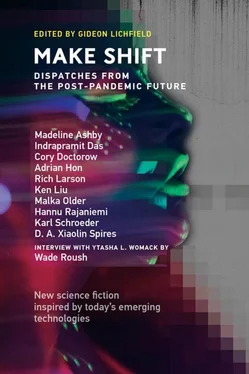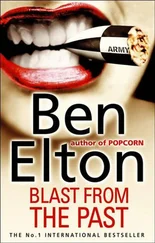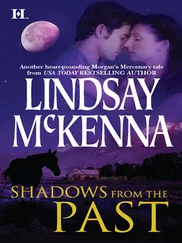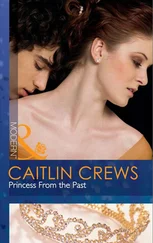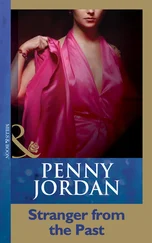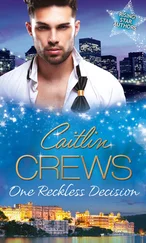DAITYA CONTACTED GOVERNMENT HQ OVER THE RADIO ONE DAY, WHEN BRISHTIwas bathing under the open palms of their giant. They no longer bathed together, because she was too old. Though Brishti had little notion of privacy because of the way they lived, even she would come to appreciate some time alone, or even separated by just the barrier of the giant’s chest, since she had never left the shadow of the giant. She still hummed loudly, by habit, or to assure her father she was outside the giant, still there.
It felt like a betrayal, but Daitya forced himself to tell HQ that he had a daughter now, and that she lived with him.
Their next trip to a mekha depot was their last with their giant.
Daitya lost his home, the body that housed him. He felt a self-loathing so powerful it nearly buckled his legs when Brishti looked at the reclaiming officers at the depot, the realization that the open secret was now no secret at all, that she had become the infection in the giant’s body, expelled along with her father from their place in god’s body.
“Please, please, please, I take very little space, please don’t take away my baba’s home,” she begged the officers. They looked sympathetic but firm behind their masks. Daitya went to tell her the truth, to calm and comfort his daughter and absorb her anger. But he saw her holding on to the giant’s leg, the worn, soiled leg of the body that had been his for so long he couldn’t remember, the body that had saved her life. Brishti, born of a superstorm and a giant. Her face mask had slid off on her tears. Looking at this, Daitya collapsed at his daughter’s feet and broke down in shuddering sobs. Brishti’s own sorrow vanished in concern as she crouched and held him. She had never seen him cry with his body, his tough, exhausted body. Only ever his eyes, when she blamed him for trying to get rid of her. He shook in her arms and begged forgiveness, and she realized what had happened, that he had done the opposite of get rid of her, like she’d feared so many times.
Though she was of the mekha, one of his tribe, he didn’t want her to be. He didn’t want her world restricted to the rib cage of a giant that did not grow with her.
IV
Shorn of his outer body, Daitya the mekha became just a father raising his teenage daughter in a small village in the forest of the Maidan.
Shorn of her outer body, Brishti the mekha became a young woman, taller than her father now and more formidable, a butcher and huntress with bow and machete. Clad in sari and gas mask, she rode out of the forests of central Kolkata on horseback with cryocaches full of meat, out to the less verdant valleys of high-rises, delivering the meat to open-air markets, sending the caches up hoisting cables to the balconies and windows of barirlok.
Though Brishti’s hands remembered the motions controlling a different body, she loved riding horses through the forest paths with her friends, some of whom fell in love with her. She fell in love with some of them. She slept with some of them under the stars, drunk on this private intimacy new to her, thrilled by the mythic danger of tigers that sometimes wandered this deep into the city, annoyed by the real danger of insects.
Sometimes, Brishti’s dreams made of her a giant running through the forest.
With the passage of time, Brishti forgave her father. Her father, who found others to love besides her: the married couple who shared their communal hut. The quiet husband a butcher, and the garrulous wife a garden-farmer. They shared their bed with Daitya, who learned their trades, and shared his body in ways he had never done before. Their daughter, a child, became as a daughter to him, and as a sister to Brishti.
By the grace of god, a family.
BRISHTI GOT OFF HER HORSE AND LOOKED OUT OVER THE MEKHA SCRAPYARD. Agraveyard of giants rusting in the rain, sinews overgrown with vines, chests heartless and filled with nests of birds and jackals that flitted across the grounds like spirits. Finally at rest, their limbs sprawled in disarray. Brishti’s contact, looking like a crow in her black cloak and gas mask, pointed the way through the winding labyrinth of bodies. Brishti led her horse carefully, not wanting her to get hurt on the rough ground.
The contact pointed at a giant, still kneeling with dignity, not disrepair. Newly arrived at the yard.
Brishti’s breath hitched. She didn’t have to check the serial number tattooed on the giant’s arm. This body, given of god, once had a heart that had sat behind those open ribs, a heart who became her father, and christened her the soul. It was her body kneeling there in the rain. A retired mekha belonged to no one. She had as much right to it as salvagers and recyclers. Was it fixable? She would take that chance.
Her contact held up two gloved fingers as a reminder. Two goats for a lead on one dead giant. Fair. Brishti nodded, tethering her horse to the broken limb of another mekha. She climbed into the giant’s ribs. Into the dank, dark chest. Her body remembered, traced the neural pathways of her father’s movements across the broken console. She could feel wind whistling through the giant’s body. Breath. Rain pattered on the broken glass of its chest. Of their chest. Brishti remembered her father’s heartbeat as she leaned her head on his chest, after he saved her. Her dear father, who had sacrificed his body for her, the body of his god. This body was no longer his. She understood that now, even if it had taken her a while.
But her father had taught her well. The giant had a new heartbeat now.
“Let me save you this time,” Brishti said.

11
Vaccine Season
Hannu Rajaniemi
THE SMALL AUTONOMOUS BOAT SKIPPED OVER THE GRAY WAVES. THE ENGINEhowled in mid-air with each jump. Every jarring landing made Torsti taste the protein bar he’d had for breakfast. The overpowering fish smell in the boat didn’t help.
For the thousandth time, he imagined what would happen when he arrived at his destination. He would jump out of the boat and run down the pier. His grandfather’s lanky form would reach down and embrace him. One shared breath and it would be done. Torsti would never have to be afraid of losing him again.
A cold spray on his face brought him back to the bucking boat. Jungfruholmen Island lay up ahead.
It was early autumn. From a distance, the blazing leaves of the trees made it seem like the island was on fire. The boat sped past the granite wave-breakers that guarded it, toward wave-polished coral-hued cliffs crowned with twisted birch and pine. A familiar pier jutted out of the stony half-moon of a beach.
In a few minutes, the boat bumped against the pier gently and came to a halt. Torsti climbed out carefully and secured his loaned vessel to a metal ring with a length of rope. There was no sign of Grandfather. The windows of the squat sauna building by the pier were dark. What if I am already too late? he thought. What if he is already dead?
A path covered in rotting leaves and pine needles wound into a patch of trees, up the cliff and toward Grandfather’s cottage. Torsti followed it, shivering in the wind.
The hiisi’s churn was just past the trees, in the middle of a large hollow. It was a gaping hole in the rock, fifteen feet in diameter. After a ten-foot drop, bottomless dark water lapped at the spiral-grooved walls. A stream of meltwater from a glacier had drilled it into the granite by rotating gravel, millions of years ago.
Torsti’s stomach tied itself into a cold knot. He had been five years old when he first came to the island with his parents to celebrate vaccine season. On a summer evening, with the red smear of the sun on the horizon, Grandfather had brought him to see the churn. In hushed tones, the old man had told him that the churn was actually an ancient portal to the stars. If you threw a rock into the spiraling grooves in just the right way, alien machines activated and opened a wormhole to wherever in space and time you wanted to go. He had closed Torsti’s fingers around a stone and told him to try.
Читать дальше
